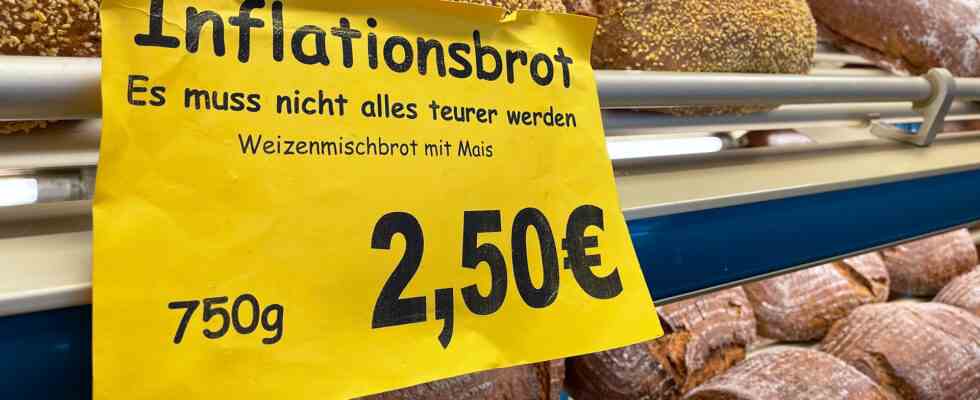Status: 09/18/2022 12:30 p.m
Bakeries struggle with rising energy and raw material prices. In order to still be able to offer their bread comparatively cheaply, some of them get creative and offer “inflation bread”.
In the display of Mario Fritzen’s bakery, his “inflation bread” stands out. “Not everything has to be more expensive,” the baker wrote on the price tag. The “inflation bread” costs 2.50 euros for 750 grams in his shop in Kürten, east of Cologne – significantly less than his other varieties.
“It’s a simple recipe – a mixed wheat bread that’s made without a lot of frills,” says baker Fritzen. He sees the “inflation bread” as an offer for customers with little money who still want to shop in a craft bakery. He doesn’t make a profit from it.
Increases in the price of energy and raw materials
Bakeries in Germany are struggling with price explosions everywhere. According to the Central Association of German Bakers, around 70 percent of them operate their ovens with gas. Even those who depend on electricity and oil have to accept large price increases. In addition, raw materials such as sugar, flour and butter have become more expensive. The companies cite the increase in the minimum wage to twelve euros per hour from October as a further price driver.
The crisis hits an industry that is already in trouble. Eight years ago there were still around 12,600 bakeries nationwide, last year there were less than 10,000. Among other things, the companies are suffering from competition from discounters. Many of them fear that they could lose more customers to supermarkets if they raise the price of bread and rolls too much.
Bread leftovers to save flour
In Hilden near Düsseldorf, baker Roland Schüren is trying to use the crisis to produce more sustainably. The organic baker uses leftover bread for his “anti-inflation bread”: “We replaced 20 percent of the flour with leftover bread, which we naturally dried, ground and roasted,” says Schüren. These leftovers are soaked and added to the dough, which saves flour.
With his “anti-inflation bread” he is also pursuing a marketing idea: “We hope, of course, that customers who come through this and buy this bread might come up with the idea of taking something else from us in the shop,” explains the baker. These are hard times for both sides – consumers and bakeries.
Baker Mario Fritzen sees his “inflation bread” as an offer for customers with little money. He doesn’t make a profit from it, he says.
Image: WDR
Construction company as a sponsor
In the southern district of Münsterland, baker Michael Tenk takes a different approach. He has his “inflation bread” sponsored by a local construction company. The sponsor pays 50 cents for each bread sold, with its logo and website emblazoned on the price tag.
He has received positive feedback for this idea from other bakers, says Tenk: “Maybe some will copy it.” The customer is relieved by the sponsoring and the company is not burdened.
Bakeries are looking for ways out of the crisis
9/18/2022 11:45 am
“Help must come”
With their “inflation breads”, the bakers want to fight the rising prices on the one hand, but also want to draw attention to their difficult situation on the other. The Central Association of the German Bakery Trade warns of a wave of bankruptcies if there is no relief from the state.
“Help must come,” says Fritzen. Otherwise he’s worried that at some point he won’t be able to make ends meet.

